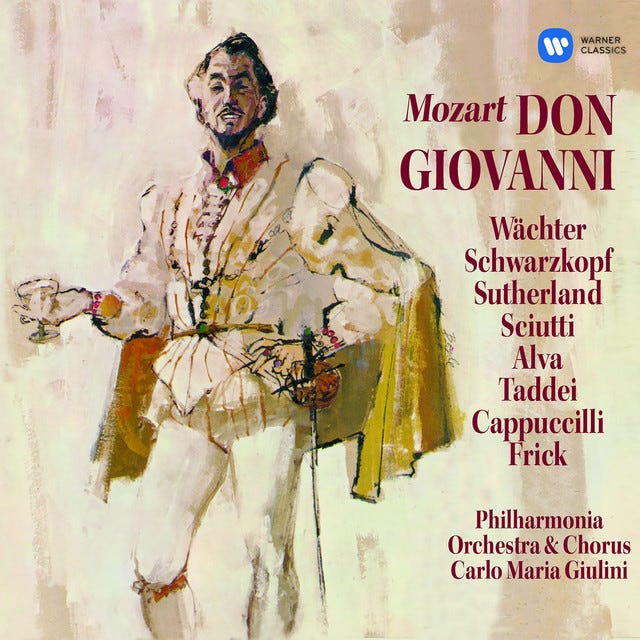Genre of the Day - Opera buffa
Album of the Day - Don Giovanni by Wolfgang Amadeus Mozart (1787)
Buffoonery, tomfoolery, and nonsense should be core pillars of any happy life. Such themes aren’t always staples of everyone’s personal music tastes, although in my opinion they should be. Today’s genre shows the importance of lighthearted music that still acts as a compelling, bedazzling theatrical journey. In the past couple hundred years, opera has increasingly become the zenith of highbrow entertainment, high art obscured for the vast majority of people by the barriers of foreign languages and, of course, price. In opera’s home, though, this hasn’t always been the case.
Opera composers by the 1700s recognized the need to bring some laughs in as the eye of the dramatic storms of their tragedies. Thus, opera buffa (jesting opera) was born in the form of short, humorous interlude acts slotted in within dramatically inclined operas, pleasant side quests. Composers and audiences alike saw the budding potential of full-length operas that leaned more on the comedic, lighthearted side while maintaining the form’s appeal thanks to meticulous musical arrangements, awe-striking vocal efforts, and accessible plots. Though opera buffa was a hit with Italian audiences, the presumably more stern French operaheads took offense at the initial interludes that inspired opera buffa. In opera’s biggest beef, French and Italian opera thinkers squared off in a 1752 debate. Despite this dissent among the French camp, opera buffa still made its ascent as a full opera form.
While its counterpoint opera seria focused on plotlines with overarching themes of death and the rigid familial stakes that might resonate with aristocracies, often informed by mythical settings, opera buffa featured situations of chaotic, amusing entanglements. The Barber of Seville, one of the most famous opera buffas, traces a barber’s effort to help pry the beautiful Rosina away from her malicious guardian on behalf of a count, delightful disguises aiding the heroes along the way.
We’ve probably all encountered a Don Juan before: a man who runs through sexual conquests with flippancy, taking the spoils and not caring about the consequences. If you’re unlucky enough to have been played by a Don Juan type yourself, Mozart’s opera buffa on the archetype will likely hit a spot for you. His name is a little less catchy here because it’s been Italianized as Don Giovanni, losing the rhyme appeal that makes it so fun to say—alas. Mozart based the story off of an Italian literary interpretation of the original Don Juan story, the Spanish play from 1630 “The Trickster of Seville and the Stone Guest.” Don Juan was an apt muse for Mozart, given the composer’s prolificness and habit of swiftly moving to the next piece during a musical era when restraint was the norm not unlike the character’s quickly cycling through women.
Though opera buffa may have more comical charm, it’s still a time-heavy endeavor with Mozart’s comedic masterpiece clocking in at two and a half hours and 72 individual songs. While I gladly would’ve hopped over to a live showing of Don Giovanni, I fear there aren’t any playing near me. Act One was still a musically invigorating and thematically intriguing introduction into the world of playboy and sleazeball Don Giovanni, whose life mission is to conquer as many women as possible by seducing them with the promise of marriage. His trifling servant reveals the count of his sexual partners to be over a thousand in Spain alone, with hundreds more scorned exes across Europe. He reveals this to none other than one of his former hookups, Donna Elvira, who subsequently swears to get her revenge. In musical form by way of the Philharmonia Orchestra’s 1959 recording, the opera retains a stunning balance of conversationality with the pristine vocals such as in Giovanni and Elvira’s confrontation of “Chi è la.” Researching the context of songs after having listened can be as amusing as the subject matter itself when discovering that a song as rapid and intense as “Fin ch'han dal vino” is simply Don Giovanni’s call to action to invite as many girls as possible to party, refusing vengeful ex-lovers to rain on his parade.
Fear not: despite his lack of fucks to give, all the parties rightfully angry with Giovanni get their peace when a zombie (a man he in fact killed) posing as a statue offers him redemption. He refuses redemption; he’s still purely driven by sex. He gets thrown into the flames of Hell, a dark end to a comical wild goose chase after Leporello gets mistaken as Don Giovanni and is nearly killed by the exes-gone-vigilantes. The humor is in Don Giovanni’s perpetually unfazed arrogance, zombies and pesky past flings be damned, but through a riveting, gorgeous musical journey Mozart illustrates the danger of being a player.





The best kind of opera- tuneful, funny and nobody dies at the end.